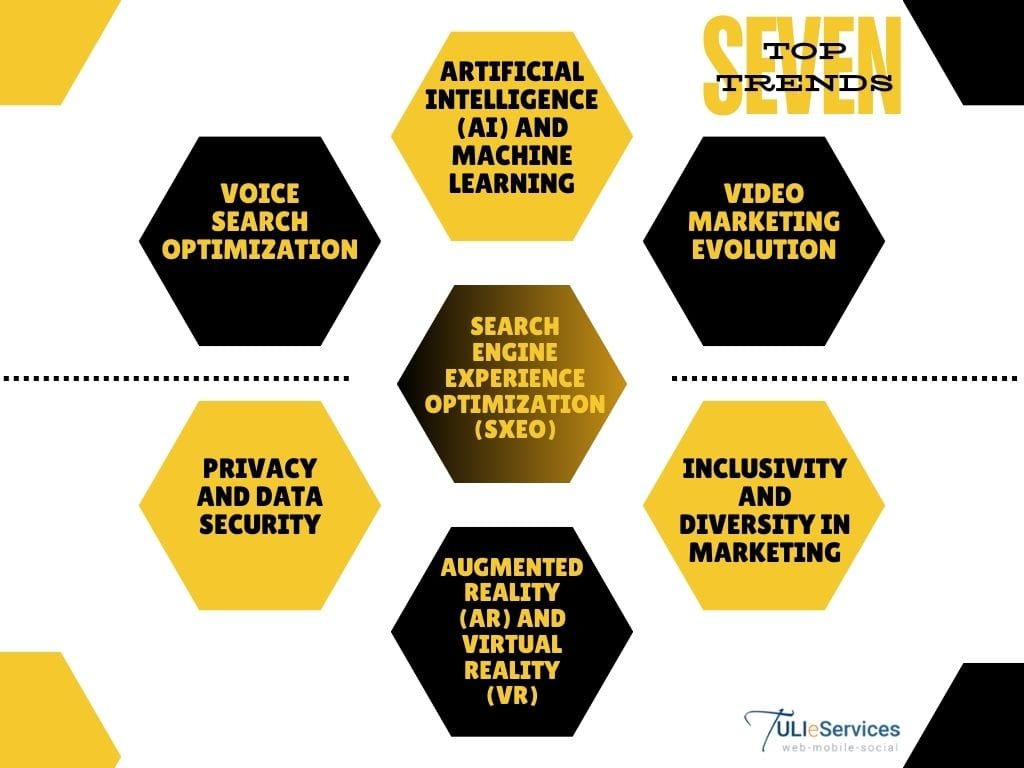 In the fast-paced world of digital marketing, staying ahead of the curve is essential to ensure your strategies are effective and relevant. As we dive into 2024, new trends and technologies are shaping the landscape of marketing in the USA and beyond. To help you navigate these changes, we’ve compiled a list of the top 7 emerging digital marketing trends that you, as a marketer, must know.
In the fast-paced world of digital marketing, staying ahead of the curve is essential to ensure your strategies are effective and relevant. As we dive into 2024, new trends and technologies are shaping the landscape of marketing in the USA and beyond. To help you navigate these changes, we’ve compiled a list of the top 7 emerging digital marketing trends that you, as a marketer, must know.
1. Artificial Intelligence (AI) and Machine Learning in Marketing
Artificial Intelligence and Machine Learning continue to be game-changers in the marketing world. Marketers are leveraging AI-powered tools to analyze massive amounts of data and gain deep insights into consumer behavior. From personalized recommendations to chatbots that provide instant customer support, AI is transforming how brands interact with their audience. Machine Learning algorithms are also enhancing predictive analytics, helping marketers make informed decisions and refine their strategies for better results.
2. Voice Search Optimization
With the rise of virtual assistants like Siri, Alexa, and Google Assistant, voice search is changing the way people find information online. Optimizing your digital content for voice search is crucial for reaching consumers who are using voice-enabled devices. Long-tail keywords, conversational content, and local SEO play a significant role in voice search optimization. Marketers need to adapt their strategies to ensure their content ranks high in voice search results.
3. Video Marketing Evolution
Video marketing is not new, but its evolution is worth noting. Short-form videos, live streaming, and interactive videos are gaining traction. Short videos, popularized by platforms like TikTok and Instagram Reels, are engaging a younger demographic. Live streaming allows brands to connect with their audience in real-time, fostering authenticity and interaction. Interactive videos, where viewers can participate, make the content more immersive and memorable.
4. Augmented Reality (AR) and Virtual Reality (VR)
AR and VR technologies are finding their way into marketing strategies, providing immersive experiences for consumers. Brands are using AR for virtual try-ons, allowing customers to visualize products before making a purchase. VR is being employed to create virtual showrooms and simulated experiences. These technologies enhance user engagement and help brands create memorable interactions that stand out in a crowded digital space.
5. Inclusivity and Diversity in Marketing
In today’s socially conscious landscape, consumers are drawn to brands that champion inclusivity and diversity. Marketers are embracing this trend by creating campaigns that celebrate various cultures, identities, and perspectives. Authenticity is key; it’s not just about representation, but about genuinely understanding and connecting with diverse audiences. Inclusive marketing not only resonates with customers but also reflects positively on brand image.
6. Privacy and Data Security
As data breaches and privacy concerns continue to make headlines, consumers are more cautious about how their data is used. Regulations like GDPR and CCPA have set new standards for data protection. Marketers must prioritize transparency in data collection and usage. Building trust with customers through ethical data practices not only ensures compliance but also fosters a positive brand reputation.
7. Search Engine Experience Optimization (SXEO)
Search Engine Optimization (SEO) has evolved into a more comprehensive approach known as Search Engine Experience Optimization (SXEO). It’s not just about keywords and backlinks; it’s about optimizing the entire user experience on your website. Factors like page load speed, mobile-friendliness, and user engagement now play a crucial role in search engine rankings. Marketers need to focus on providing a seamless and enjoyable online experience for users.
Conclusion
The digital marketing landscape is ever-changing, and staying informed about emerging trends is essential for success. From the integration of AI and voice search optimization to the evolution of video marketing and the use of AR/VR, these trends are reshaping how marketers engage with their audience. Additionally, embracing inclusivity, prioritizing privacy, and adopting a holistic approach to SEO are pivotal for maintaining a competitive edge.
As you navigate through 2024 and beyond, incorporating these trends into your marketing strategies can help you create meaningful connections with your target audience, drive brand growth, and stay ahead in the dynamic world of digital marketing. Embrace change, innovate, and always be ready to adapt to the next wave of trends that will shape the future of marketing.

